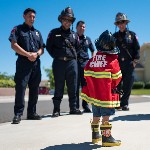 “Why do I need to know this?” It’s a question that echoes across Wisconsin’s classrooms from our biggest school districts to our smallest. “Career-connected learning” offers one way of addressing the question of relevance. When a math teacher brings in a civil or mechanical engineer to explain how she uses trigonometry to calculate torque and forces on objects, such as bridges or building girders, the teacher is using career-connected learning. Or when a world language teacher asks his students to research careers that require the ability to speak multiple languages, again, that’s career-connected learning. In other words, career-connected learning helps students understand how the content they are learning applies to various careers. And this year, 16 school districts are diving deep to explore this exciting approach and its benefits.
“Why do I need to know this?” It’s a question that echoes across Wisconsin’s classrooms from our biggest school districts to our smallest. “Career-connected learning” offers one way of addressing the question of relevance. When a math teacher brings in a civil or mechanical engineer to explain how she uses trigonometry to calculate torque and forces on objects, such as bridges or building girders, the teacher is using career-connected learning. Or when a world language teacher asks his students to research careers that require the ability to speak multiple languages, again, that’s career-connected learning. In other words, career-connected learning helps students understand how the content they are learning applies to various careers. And this year, 16 school districts are diving deep to explore this exciting approach and its benefits.
Career-connected learning offers built-in engagement by combining academic content with students’ personal interests, supportive relationships, and future career options. Most importantly, it provides an opportunity to expand a CTE course beyond its traditional boundaries by blending it with other subjects such as math, science, English, world language, and other content areas.
Three teams at DPI—CTE, Teaching & Learning, and Literacy & Mathematics—are working together to offer “Careers in the Classroom,” a transdisciplinary community of practice (CoP). The 12-week series, running from October to April, calls on participating districts to assemble a team of teachers (math, science, English, world language, career and technical education, English as a second language, gifted & talented, special education, etc.), school counselors, the curriculum director and building-level administrators to create a vision for career-connected learning in their district and develop short- and long-term goals.
For example, the Oconomowoc Area School District is creating a customized resource guide for educators, at any level or in any content area, to assist in the planning and implementation of career-connected learning into curricular units or lesson plans. Danielle Chaussee, High School Spanish Teacher and Global Scholars Program Coordinator, shares why the district has decided to take this approach:
“Today, more than ever, students are eager to make real-world connections between their learning and life beyond high school. And, when those connections are visible, students are highly engaged in their learning!
Our district has long been committed to engaging students with future career pathways. To that end, we saw [participating in the Careers in the Classroom community of practice (CoP)] as an additional opportunity to form a collaborative group of educators, from varied content areas, to work on bringing additional resources to teachers and opportunities to students.
As a result of this CoP, all classrooms at our school will have access to career-connected learning resources. Our hope and expectation is that this leads to additional opportunities to further connect all students to their future goals.”
The Rio Community School District is also seeing the value in integrating career-connected learning into all content areas. According to Brittany Cashman, principal at the middle and high school:
“Our students genuinely want to learn! Secondary students beg for engaging learning opportunities. Through career-connected learning, our students have the agency (choice/voice/autonomy) to participate in coursework and activities that align to areas of interest and their chosen career cluster and pathway. Academic and Career Planning personalizes the learning experience for our students and allows them to implement higher depths of knowledge and skill that they might not have done before. We are now seeing students take more ownership of their education by approaching staff members with innovative ideas regarding how they can blend classroom instruction with experiences that are meaningful to their future.”
As a result, the Rio Community School District has already begun to identify career-connected learning opportunities that naturally align with core content areas, for example, incorporating into English courses such assignments as professional email writing, completing job applications, resume writing, and writing a work accident report. In addition, homeroom assignments will be based on career clusters that students have expressed interest in. Homeroom teachers from related subject areas will be responsible for implementing hands-on activities specific to the cluster beyond what is infused into classroom curriculum.
Knowing that there are 14 additional districts doing similar work as the Oconomowoc and Rio communities is good news for our students!
—Karin Smith, ACP and Dual Enrollment Education Consultant, CTE Team, Wisconsin Department of Public Instruction